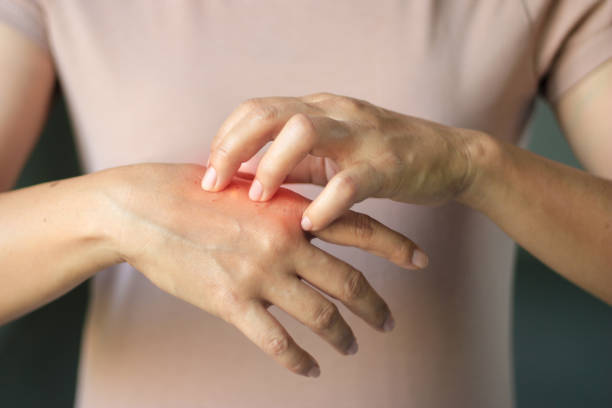
There is a good chance that one person in 10 has eczema. It can be complicated to treat and uncomfortable if that is you. This common skin condition is complicated, and there are many things to learn.
If you have eczema, it might be worth speaking with a dermatologist to conduct a skin patch test. This will help you determine if you are allergic to topical ingredients that could be causing your skin problems. You can also confirm your eczema type by patch testing.
Experts tell SELF that having a patch tested for people suffering from eczema is a good idea. Also, you can find all the information about the process.
What exactly is eczema?
Summary: It is not one thing. Kristel Polder is a dermatologist and adjunct professor at the University of Texas Southwestern Department of Dermatology. “Eczema” is a generic term that covers inflammatory skin conditions. The American Academy of Dermatology states that there are seven types of eczema. Although there are many different types, the common symptoms are the same: Eczema can cause skin irritations that may be severe. Peter Lio is a clinical assistant professor of dermatology at Northwestern University’s Feinberg School. He is also a member of the Scientific & Medical Advisory Council of the National Eczema Association.
“Eczema,” which most people call a rash-like area of skin inflammation, is usually called atopic dermatology (AD), according to Dr. Lio. This is the most common form of eczema, so it makes sense that both terms are frequently interchangeable. A variety of factors can cause atopic dermatitis. Many people have a genetic component. This is a defect in the protein filaggrin that causes a compromised, leaky’ skin barrier. Dr. Lio says that many environmental factors can play a role, such as weather, diet, and exposure to certain substances or materials.
Atopic dermatitis can be a chronic condition that has no cure. However, there are many ways to manage it and keep it under control, Hayley Goldenbach, MD, a Brown University dermatologist and assistant professor, tells Self.
Another common type is contact dermatitis. Dr. Goldbach explained that, in this instance, the skin responds to a trigger that triggers the inflammation. Dr. Goldbach explains there are two types of allergic contact dermatitis (ACD) and one type (ICD).
Irritating contact dermatitis is a skin injury. The immune system is not involved. Irritating contact dermatitis is a more general term. Dr. Goldbach states that if anyone uses retinoids excessively (which can cause skin irritation, especially the first time you use them) or any industrial-strength soaps, almost everyone will experience some degree of. Because allergic contact dermatitis can be caused by allergens unique to each individual, it is more personal.
Is there a link between skin allergies and eczema, or is it just a coincidence?
It is possible to look at the relationship between allergic contact dermatitis and atopic dermatologtitis more precisely. (Again, please keep with us that both are types of eczema).
Dr. Lio says there is a connection between contact dermatitis (atopic dermatitis) and atopic skin conditions. However, it is more vital than people might think. 2 “There is a stronger correlation between atopic dermatology and food allergies and asthma.” 3 4
Dr. Rabach says that there are mixed results to the research. Some studies show that people with atopic skin conditions are more likely to develop allergic contact dermatitis. Others find that this is not the case. 5 6 Her take on it: “Although this link is controversial, there is a possibility that someone with atopic dermatitis could be more likely to develop allergic contact dermatitis,” she states. This is why it would happen. This could theoretically happen. 6
People with AD also tend to try different products to relieve their symptoms. This means that they are exposing their skin to more allergens. Dr. Lio says. 7
What are the symptoms that warrant a skin patch test?
Although the relationship between atopic dermatitis, allergic contact dermatitis, and atopic dermatitis is not clear, the three dermatologists. SELF agreed that patch testing could benefit some people suffering from atopic dermatitis, especially under certain conditions.
Dr. Rabach says that AD symptoms usually occur behind the knees and in the crooks at the elbows. Dr. Rabach says rash-like symptoms are most common in the back, elbows, and face.
Dr. Polder also notes that there are areas where allergic contact dermatitis can occur. Dr. Polder notes that many people react to dark hair dye. This can lead to irritation of the neck and ears. These rashes can also indicate that it is time to have a patch test.
If your atopic skin condition isn’t improving, you should consult your doctor about patch testing. Your skin problems may not respond to gentle moisturizers or barrier creams. This could indicate that your symptoms are more serious. Dr. Lio suggests a patch test can help determine if your symptoms indicate an allergic response. He says there may be mild cases of AD that don’t respond to any treatment. The latter group should speak to a dermatologist about patch testing to ensure that they are not suffering from allergic contact dermatitis.



